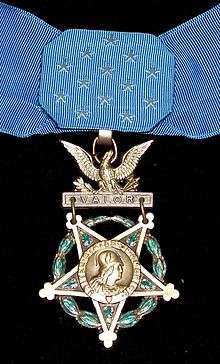Junior J. Spurrier
| Junior James Spurrier | |
|---|---|
 | |
| Born |
December 14, 1922 Russell County, Virginia[1] |
| Died |
February 25, 1984 (aged 61) Tennessee |
| Place of burial | Mountain Home National Cemetery, Johnson City, Tennessee |
| Allegiance | United States of America |
| Service/branch | United States Army |
| Years of service | 1940 - 1951 |
| Rank | Staff Sergeant |
| Unit | 134th Infantry Regiment, 35th Infantry Division |
| Battles/wars | World War II |
| Awards |
Medal of Honor Distinguished Service Cross Combat Infantryman Badge |
Junior James Spurrier, born James I. Spurrier, Jr., was a former American combat soldier who received the nation's two highest military decorations for valor—the Medal of Honor and Distinguished Service Cross—for his heroic actions in World War II.
Biography
James I. Spurrier, Jr. was born on December 14, 1922, in Russell County, Virginia.[1]
- US Army
In September 1940, he enlisted in the US Army. Spurrier filled his name in the wrong blanks when enlisting and became known as "Junior J. Spurrier" to the Army. In World War II, near Lay St. Christopher, France, he earned the Distinguished Service Cross for spearheading an assault on a stubbornly defended hill position. While positing himself on an American tank destroyer twice, he used the .50-caliber machine gun to kill over 12 Germans and capture 22 others. While on the ground, he personally destroyed two enemy dugouts with grenades.
- Medal of Honor
On November 13, 1944, while serving as a Staff Sergeant with Company G, 134th Infantry, 35th Infantry Division, While singlehandedly attacking and fighting Germans in a village in Achain, Moselle, France, Spurrier repeatedly returned to his company's command post with prisoners and replenished his ammo to continue his attack on the occupied village. Spurrier earned the Medal of Honor for nearly single-handedly capturing the village of Achain that day. He received the Medal of Honor on March 6, 1945 from Lt. Gen. William Hood Simpson.
- Post World War II and death
Spurrier had a very turbulent life after the war. He had a severe problem with alcohol, was discharged from the us Army in 1951, and served two jail sentences.
He died on February 25, 1984 in Tennessee. He is buried in Mountain Home National Cemetery, Johnson City, Tennessee.
On Dec. 02 2011, Spurrier's Medal of Honor was returned to his family after being located by Chief Craig Corkrean, in a safe belonging to his father.
Medal of Honor
Staff Sergeant Spurrier's official Medal of Honor citation reads:
For conspicuous gallantry and intrepidity at risk of his life above and beyond the call of duty in action against the enemy at Achain, France, on 13 November 1944. At 2 p.m., Company G attacked the village of Achain from the east. S/Sgt. Spurrier armed with a BAR passed around the village and advanced alone. Attacking from the west, he immediately killed 3 Germans. From this time until dark, S/Sgt. Spurrier, using at different times his BAR and Ml rifle, American and German rocket launchers, a German automatic pistol, and handgrenades, continued his solitary attack against the enemy regardless of all types of small-arms and automatic-weapons fire. As a result of his heroic actions he killed an officer and 24 enlisted men and captured 2 officers and 2 enlisted men. His valor has shed fresh honor on the U.S. Armed Forces.
See also
References
- 1 2 "Medal of Honor Recipients - World War II (M-S)". U.S. Army Center of Military History. U.S. Army. Retrieved 10/3/2011. Check date values in:
|access-date=(help)
- "Junior J. Spurrier". Claim to Fame: Medal of Honor recipients. Find a Grave. Retrieved 2008-10-27.
- Murphy, Edward F. "Junior J. Spurrior." Heroes of World War II. Presidio P, 1990. 205-08.